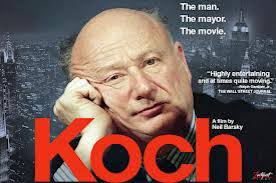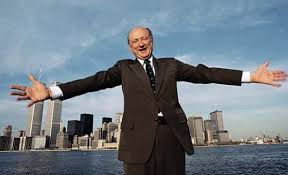 Those who lived in New York City during the Ed Koch years will have a visceral reaction to a new documentary about the man once called America’s Mayor in a Time magazine cover story.
Those who lived in New York City during the Ed Koch years will have a visceral reaction to a new documentary about the man once called America’s Mayor in a Time magazine cover story.
For everyone else, the feature-length “Koch” will give a fascinating look back at a time in American history when crime ran rampant in its largest city – which had teetered on bankruptcy – minorities struggled to have their voices heard and their concerns addressed, graffiti and filth marred its subway system and gay activists launched protests to combat the sweeping AIDS epidemic.
More than that, the film, part of PBS’s POV series and directed by Neil Barsky, gives viewers a warts-and-all look at the man who ran the Big Apple during what the first-time director called dangerous, dirty, dysfunctional but magical days from 1978-1989.
Like many things about New York during his three terms, people either loved or hated Koch, emblematic as he was of the city’s brashness, bluntness, combativeness and shrewdness — but most heartily approved. In 1981, he was reelected with a staggering 75% of the vote; in the second reelection, the margin rose to 78%.
In a signature tactic which became almost cliché, he would stand on street corners and asked passersby, “How am I doing?”
So we asked Barsky, who had unprecedented access to the still-active former mayor for a year and a half until shortly before he died in February 2013 at the age of 88, about Koch’s legacy— just how did he do. Overall, he credits Koch with planting the seeds of New York’s recovery, leading it to become the overwhelmingly safe and prosperous metropolis it is today.
“He did a phenomenal job of restoring the city’s fiscal condition as well as injecting New York with a much needed boost of adrenaline and morale building,” said Barsky, who lived in NYC during the Koch years as a student and then a newspaper reporter, although he did not cover City Hall. “His greatest achievement was a $5.5 billion dollar program to rehabilitate and build housing for low to moderate income people, which reshaped the city. However, he was thrown out of office because of his inability to relate to many communities who turned on him.”
Throughout his public life, Koch was dogged by questions about his personal life, specifically his sexual orientation. It was widely thought that he was closeted gay. But when asked about it in the 1980s, he said he was heterosexual and late in his life when questioned by Barsky, he said, “It’s none of your fucking business.”
In the 1977 Democratic mayoral primary that had pitted Koch—who made appearances with former Miss America Bess Myerson at his side– against incumbent Abe Beame, Bella Abzug and Mario Cuomo, signs were posted that said, “Vote for Cuomo, not the homo.” They were disavowed by the Cuomo campaign and quickly taken down, but the damage was done.
“It was a very potent accusation. At the time, you could be gay or mayor but you couldn’t be both,” Barsky said. “There was an ugliness to it, and it was the root of his anger toward Cuomo– even though towards the end of his life, he endorsed Mario’s son Andrew for governor of New York.”
Despite the fact that Koch pushed through an ordinance prohibiting discrimination against gays and lesbians in 1986– revolutionary at the time – the LGBT community held him responsible for not doing enough to fight AIDS.
“The backlash to his reaction to the AIDS crisis obscured and overwhelmed his achievements on the civil rights front,” said Barsky. “I think it goes to empathy. All he had to say was, ‘This is a tragedy of epic proportion.’ He did eventually. He didn’t show the leadership. If you interview members of the AIDS activist community, he is reviled. Larry Kramer, author of ‘The Normal Heart,’ was very tough on Koch. Eventually the city caught up, but it took too long.”
The black community also turned against Koch after several incidents that created large street protests– the closing of Sydenham Hospital in Harlem and the 1989 murder of a young black man, Yusef Hawkins, by a group of white teenagers.
“He could’ve said it was a travesty and tragedy and mourned with the family, and he would’ve been reelected,” Barsky said. “Instead he said not to march through the neighborhood where it happened. Each of these times, he was not able to relate to people on a human level.”
Also in his third term, a municipal corruption scandal, including the suicide of one of the accused, Queens borough president Donald Manes, rocked the administration– although Koch himself was clean.
When Koch ran for a fourth term in 1989, he was defeated by David Dinkins, who went on to top Rudy Giuliani in the general election and to become New York’s first black mayor.
But as viewers will see in the film, which was released theatrically last year on what turned out to be the day he died, Koch did not ride off quietly into the sunset after he was denied a fourth term.
The lifelong Democrat who had served in the Army during World War II remained politically active, endorsing candidates– including Republicans Rudy Giuliani and later Michael Bloomberg for mayor of New York — appearing as a commentator on talk shows, lecturing and writing books.
“Once we started shooting the film, it became clear just how personally compelling Koch—then 87—still was,” said Barsky. “He tirelessly hopped from campaign stop to campaign stop, from speaking engagement to speaking engagement. He bared his teeth at anyone who challenged him in a public forum; he still shined brightly when he was the center of attention. And he could not walk down a New York City street without being approached by an admirer.”
The energetic Koch, who apparently planned never to retire, was a partner in a law firm, an adjunct professor at NYU and a visiting professor at Brandeis University, served as the judge on “The People’s Court” from 1997-1999, hosted a highly-rated radio program and an online movie review show called “Mayor at the Movies.”
“New York loves to see itself the center of the world, even if it’s not,” said Barsky. “But to us New Yorkers, it’s the world capital, and it tends to attract larger-than-life characters. Ed Koch’s story is in many ways the story of the city. To this day, I cannot think of a New Yorker as popular or as polarizing.”
(“Koch” airs Monday, September 22 at 10 p.m. ET/PT on PBS stations. Check local listings.)
–Hillary Atkin


